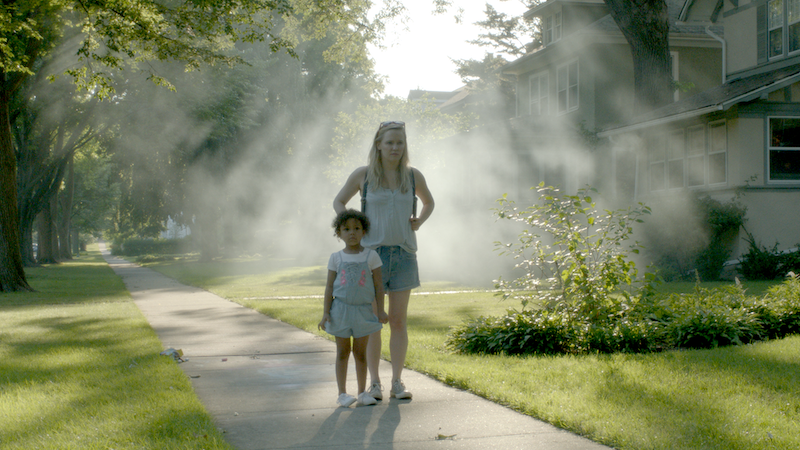Saint Frances: A Heartfelt, Unfiltered Story of Womanhood
Review of Saint Frances Virtual Screening at The Grand Illusion Cinema
Written by Teen Editor Olivia Sun and edited by Press Corps Teaching Artist Kathy Fennessy

Attention: Spoilers Ahead!
There are two types of people in the world: those who have no idea what they’re doing with their life, and those who pretend like they know what they’re doing.
Too often, we feel like we’re navigating life alone; yet, that’s far from the truth. In Alex Thompson’s Saint Frances, it’s apparent that everyone—even those who are seemingly successful—deals with struggles of their own. Screenwriter and actor Kelly O’Sullivan crafts a semi-autobiographical, heartfelt story of motherhood, romance, depression, friendship, and trust that reflects her real-life experiences. Although Saint Frances leaves us with no neat or easy answers, it certainly showcases an authentic, unfiltered portrayal of womanhood.
Evanston, Illinois-based Bridget (O’Sullivan) is a 34-year-old Northwestern dropout, former creative writing prodigy, and restaurant server. That is, until she quits her restaurant job when lesbian couple Maya (Charin Alvarez) and Annie (Lily Mojekwu) hire her as a nanny. While attempting to improve her inept caretaking skills, Bridget must also deal with the implications of an unplanned pregnancy with Jace (Max Lipchitz).
Saint Frances centers around Bridget’s failures, yet as the plot unwinds, we discover she’s not the only one needing support and direction. Maya, a loving mother of two, slowly crumbles under postpartum depression, while Annie, the successful breadwinner of the family, feels guilty for being so absent. And Jace is an endlessly compassionate guy, but remains stuck as a restaurant server. The film has no heroes or villains: rather, every character is flawed, just like how real people are far from perfect. Saint Frances is a coming-of-age story about a grown woman, not a young girl. Because after all, the search for identity and meaning enters well into adulthood.
Saint Frances delivers several truths—many of which are rarely discussed in film. First, women—not just men—contribute to the upholding of a patriarchal society, as demonstrated by the snobby mother that Bridget and Maya meet at the park. Ultimately, the film stresses the importance of finding solace in female solidarity. Additionally, sassy yet charming little girl Frances (Ramona Edith Williams) gives us many unfiltered truths. Her curiosity, honesty, and wisdom reminds us to trust and listen to young people. Finally, when Bridget shares some of her mother’s unglamorous parenting moments with struggling parents Annie and Maya, we learn the importance of vulnerability. Saint Frances gives us a peek at how opening up and sharing stories of weakness are powerful tools of recovery: we should never have to battle personal struggles on our own.

I found the cinematography in the film particularly intriguing. The filmmakers never utilize typical cinematic lighting; rather, natural lighting emphasizes the raw, unglamorous elements of femininity. I felt like I was peering into aspects of life that I shouldn’t be seeing—they effectively create drama without the need for dramatic lighting. Saint Frances features a lot of blood; however, unlike your typical Hollywood film, it isn’t the aftermath of a fight scene or a murder. In fact, menstrual and postpartum blood is a recurring motif. I haven’t seen menstrual blood displayed so blatantly on screen before, despite being so humanly natural…and that clearly says something about our puritanical society.
I was thoroughly impressed by the plotline, cinematography, and message of this indie dramedy. However, the character development of Isaac (Jim True-Frost), Bridget’s hook-up and guitar teacher, felt abrupt and underwhelming. Moreover, Bridget’s personality could be irritating to the extent that it was difficult to empathize with her. Despite being unpleasant and ungrateful, Bridget still receives forgiveness time and time again—perhaps sending the wrong message that we should get free passes in life.
Yet overall, Saint Frances is a major win for female empowerment. Its approach to abortion is refreshing, and it successfully takes a step forward in normalizing lesbian relationships. Jace’s “nice guy” personality is pleasantly disruptive as well, given that men in modern film are still too often shaped by toxic masculinity. In less than two hours, Saint Frances even manages to shine light upon the loneliness epidemic ravaging many Gen Z and Millennial members today.
Saint Frances isn’t your typical happy-go-lucky rom-com, but nor is it an epic tragedy. It’s a snippet of the life of a woman named Bridget whose experiences might reflect the lives of many people across the nation. It’s a reminder that there are no absolute heroes or villains in our world—rather, good and bad lives in each of us, and it is our choice to decide what to act upon. While we’re all stuck at home, it’s the perfect bittersweet film that encourages us to find hope in solidarity during this time of uncertainty.
Saint Frances is screening virtually through The Grand Illusion Cinema April 2-9, 2020. For event information see here.
Lead photo caption: Ramona Edith Williams and Kelly O'Sullivan in Saint Frances (2019).
This review was written as part of mentorship program where members of the Teen Editorial Staff receive one-on-one mentorship by Press Corps Teaching Artists and professional critics. The Teen Editorial Staff is made up of 6 teens who lead the TeenTix Newsroom and curate the review portion of the TeenTix blog. More information about the Teen Editorial Staff can be found HERE.
The TeenTix Press Corps promotes critical thinking, communication, and information literacy through criticism and journalism practice for teens. For more information about the Press Corps program see HERE.

